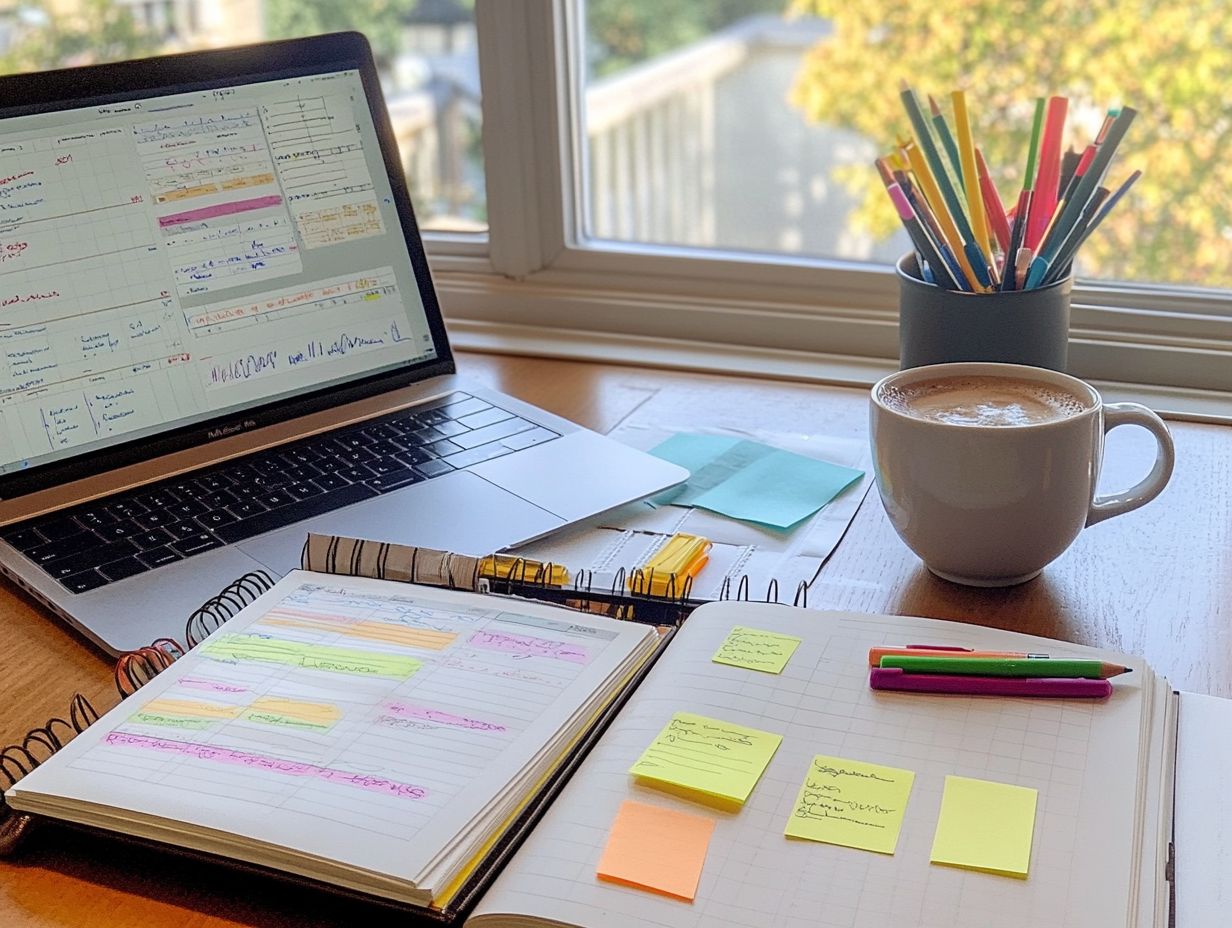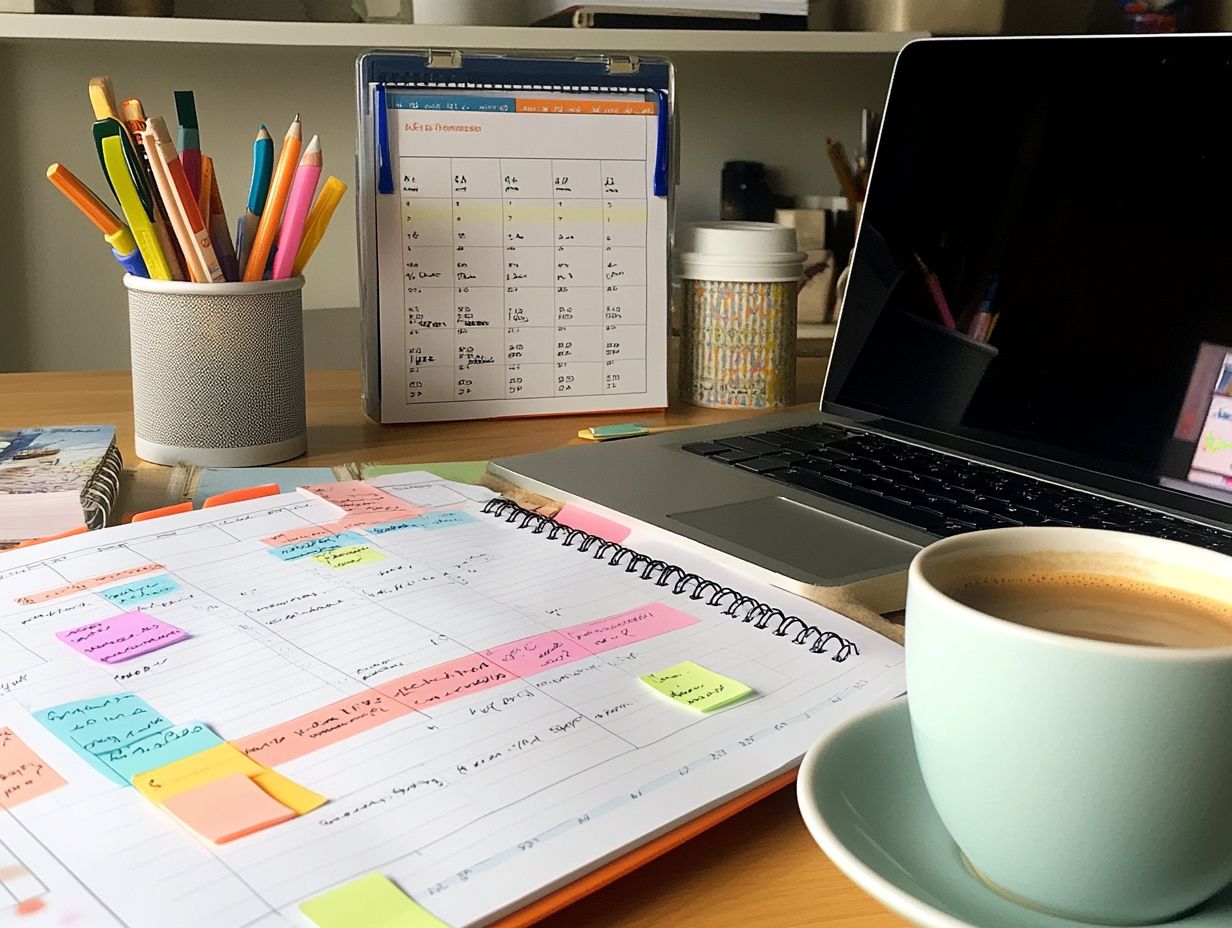how to create a test preparation study schedule?
Creating an effective study schedule is essential for anyone preparing for tests. It organizes your study time and enhances your overall learning experience. Get ready to transform your study routine!
This article delves into the significance of having a study schedule, guiding you through key considerations like identifying your goals and evaluating your current study habits. You ll discover practical steps for breaking down material, setting realistic objectives, and incorporating necessary breaks.
You ll also find valuable tips for adhering to your schedule and adapting it when unforeseen challenges pop up. Get ready to elevate your study routine into a powerhouse of productivity!
Contents
- Key Takeaways:
- The Importance of a Study Schedule
- Factors to Consider Before Creating a Study Schedule
- Evaluating Your Study Habits
- Steps to Creating an Effective Study Schedule
- Tips for Sticking to Your Study Schedule
- Modifying Your Study Schedule as Needed
- Frequently Asked Questions
- What are the benefits of creating a test preparation study schedule?
- How do I determine how much time to allocate for each subject in my study schedule?
- Is it better to study for multiple subjects in one day or focus on one subject at a time?
- How can I make my study schedule more effective?
- Should I include time for leisure activities in my study schedule?
- How often should I review my study schedule?
Key Takeaways:

Having a study schedule can greatly improve your test preparation by helping you stay organized and focused. Before creating a study schedule, consider your goals, priorities, and study habits to develop a realistic plan. For guidance, check out this resource on how to create an effective study schedule.
To stick to your study schedule, use accountability and motivation strategies, and be willing to modify it as needed for unexpected events or changes in study habits.
The Importance of a Study Schedule
Establishing a meticulously crafted study schedule is vital for your academic success, giving you the power to manage your time effectively while prioritizing your learning objectives. To enhance your preparation, consider exploring how to stay organized during test prep.
A comprehensive study plan not only helps you build self-discipline but also nurtures effective studying habits, allowing you to dedicate focused time to various subjects and projects.
This structured approach benefits both online students and traditional learners, helping you balance your study commitments with extracurricular activities.
Ultimately, this can skyrocket your grades and lead to a deeper sense of satisfaction in your educational journey.
How a Study Schedule Can Improve Test Preparation
A meticulously designed study schedule can dramatically elevate your test preparation by breaking down complex subjects into manageable study blocks that align with your unique learning style. For more guidance, check out this resource on how to write a study plan for test preparation.
This structured approach gives you the power to implement effective review strategies, ensuring you cover all essential material within a set timeframe.
By setting aside specific study times, you can easily monitor your progress and refine your techniques as necessary, cultivating a robust sense of accountability. To enhance your organization, consider how to keep track of test preparation deadlines. Scheduled study time not only fosters consistency but also alleviates the stress that often accompanies last-minute cramming.
Integrating a diverse array of study techniques, such as active recall and spaced repetition, can further enhance retention, transforming the learning process into something both efficient and enjoyable.
Ultimately, this prepares you to approach your major exams with renewed confidence.
Factors to Consider Before Creating a Study Schedule
Before you dive into crafting a study schedule, take a moment to assess your current study habits. It’s crucial to establish clear learning goals that resonate with your academic responsibilities, which can be informed by understanding the best study techniques for test prep, allowing you to create a plan that truly supports your success.
Identifying Your Goals and Priorities
Identifying your learning goals and priorities is a crucial first step in crafting a study schedule that harmonizes with your academic responsibilities.
By breaking down larger objectives into specific, measurable goals, you can establish clear milestones that effectively guide your study sessions. For example, rather than simply aiming to “study biology,” it’s far more productive to set a goal such as “master cell structure by the end of the week.” This clarity not only amplifies your motivation but also provides a concrete way to track your progress.
Prioritizing tasks based on deadlines and the difficulty of subjects ensures that you tackle important responsibilities first, leading to a more organized approach. This structured planning enhances your academic success and fosters a sense of control over your learning journey.
Evaluating Your Study Habits

Evaluating your study habits offers valuable insights into your academic performance. It highlights areas that may need improvement while fostering self-discipline in your study approach.
One effective technique is to meticulously track the time you spend on different subjects. This helps you identify where your focus may be slipping. By maintaining a detailed log, you can observe patterns in your study behavior and make necessary adjustments.
For example, analyzing your study sessions could reveal if you’re dedicating enough time to challenging topics or if distractions are sabotaging your productivity. This awareness fosters a proactive attitude toward learning, ultimately improving your material retention and elevating your grades.
Incorporating tools like digital planners or study apps can streamline this process, ensuring you have an organized and efficient study routine at your fingertips.
Steps to Creating an Effective Study Schedule
Crafting an effective study schedule requires a thoughtful approach. To enhance your study sessions and foster efficient learning, consider how to stay motivated during test preparation by incorporating strategic steps that ensure optimal time allocation.
By considering how you allocate your time, you can significantly enhance your overall study experience and information retention.
Breaking Down Your Study Material
Breaking down your study material into smaller, manageable parts significantly boosts the effectiveness of your study techniques. This method allows you to focus on specific topics without feeling overwhelmed.
Implementing study blocks helps you prioritize review sessions, ensuring that each segment receives the attention it deserves. For instance, the Pomodoro Technique involves studying in short bursts followed by breaks to enhance retention.
Integrating active recall methods such as self-quizzing or discussing materials with peers deepens your understanding while reinforcing essential information. Thorough preparation involves breaking down content and employing a variety of strategies for comprehensive mastery.
Setting Realistic Study Goals
Setting realistic study goals is essential for maintaining motivation and achieving academic success while ensuring a balanced study schedule.
By understanding the difference between long-term and short-term objectives, you can tailor your study strategies to align with your academic aspirations. Long-term goals act as a roadmap, helping you stay focused on achievements like graduating with honors.
Short-term goals serve as achievable milestones, providing a sense of accomplishment along your journey. This dual approach nurtures effective time management and boosts your study efficiency.
You ll be able to allocate your resources wisely and make consistent progress. Ultimately, this synergy creates a study environment where your motivation flourishes, making academic success a tangible reality.
Allocating Time for Each Subject
Allocating the right amount of time for each subject in your study schedule is essential for managing your academic commitments effectively.
Start by assessing the complexity of each subject; some will require more focus than others. Evaluating past performance alongside upcoming exams will help you prioritize your study time effectively.
Using time management techniques, like the Pomodoro Technique or time blocking, allows you to engage in focused study bursts while incorporating well-deserved breaks. Creating a visual timeline can assist in juggling your commitments, ensuring that you dedicate ample time to both challenging subjects and lighter coursework.
This thoughtful strategy leads to improved understanding and retention of the material.
Are you ready to take charge of your study habits? Start tracking your study time today!
Including Breaks and Rest Days

Regular breaks and rest days are crucial for keeping your motivation high and improving your study efficiency.
Short breaks during study sessions help your brain recharge, boosting both focus and memory retention.
Research shows that taking breaks can foster greater creativity and sharpen problem-solving skills both essential for tackling complex subjects.
Incorporating these pauses into your routine can help prevent burnout. This approach empowers you to tackle your material with renewed enthusiasm and a clearer mindset.
Ultimately, it transforms your study experience into one that improves understanding and elevates your performance.
Tips for Sticking to Your Study Schedule
Sticking to your study schedule requires a mix of accountability measures and motivation strategies. This ensures steady progress toward your learning goals.
Accountability and Motivation Strategies
Studying with partners creates a supportive environment. Sharing goals and celebrating achievements keeps distractions away and builds responsibility.
Using progress tracking techniques like maintaining a journal or utilizing digital tools provides visual motivation. Seeing your achievements, no matter how small, can boost your morale and encourage consistency.
Combining these approaches creates a powerful framework that reinforces your dedication to your academic goals.
Modifying Your Study Schedule as Needed
Adjusting your study schedule is essential for dealing with unexpected situations and changes in your study habits. This flexibility ensures steady progress toward your academic goals.
Adjusting for Unexpected Events or Changes in Study Habits
When unexpected events arise, it s vital to modify your study schedule to stay aligned with your commitments and goals. Balancing life s demands with educational objectives can be challenging.
By reevaluating your priorities and reallocating your study time, you can navigate these complexities more effectively. Identify which tasks are time-sensitive and require immediate attention.
Incorporating shorter study sessions can enhance retention without overwhelming you. Utilize planners or digital apps to track deadlines and commitments. This way, you can embrace flexibility while keeping accountability a focus.
Frequently Asked Questions

Here are some common questions about creating a test preparation study schedule.
What are the benefits of creating a test preparation study schedule?
Creating a test preparation study schedule helps you stay organized, manage your time effectively, and prioritize your studying. Learning how to develop a test preparation schedule also allows you to track your progress and ensures you cover all necessary material before the test.
How do I determine how much time to allocate for each subject in my study schedule?
The time you allocate for each subject should depend on the difficulty of the material and your proficiency in that subject. Allocate more time for subjects you find challenging compared to those you excel in.
Is it better to study for multiple subjects in one day or focus on one subject at a time?
This depends on your personal preference and study habits. Some people find switching between subjects helpful to avoid boredom and fatigue, while others prefer focusing on one subject to maintain concentration. Experiment with both methods to see which works best for you.
How can I make my study schedule more effective?
Make your study schedule more effective by including ample breaks between study sessions. To enhance your preparation, consider how to set realistic goals for test preparation by using different ways to study, like flashcards and practice tests, and reviewing material frequently instead of cramming.
Should I include time for leisure activities in my study schedule?
Include time for leisure activities in your study schedule. Taking breaks and doing activities you enjoy help you recharge and prevent burnout. Keep leisure time within limits to stick to your schedule.
How often should I review my study schedule?
Your study schedule should be flexible. Review and adjust it weekly to fit any changes in your workload and track your progress. If it s not working well, make necessary changes to improve it.






